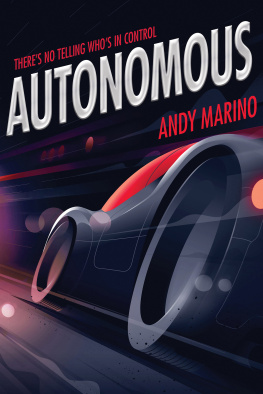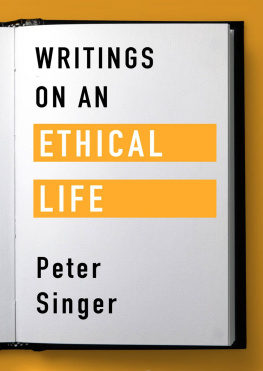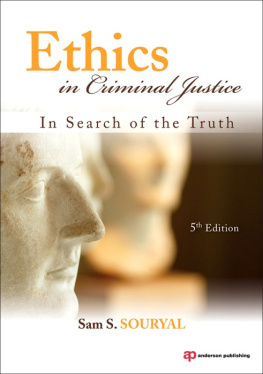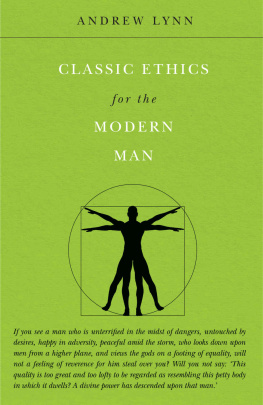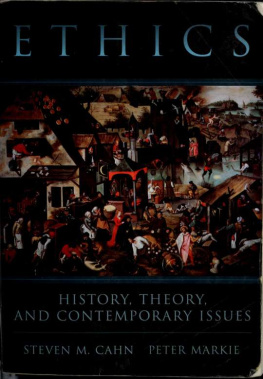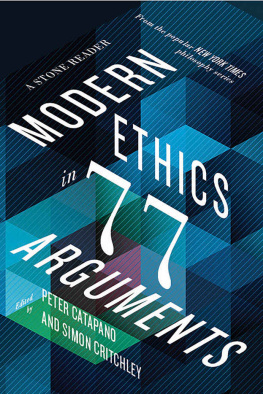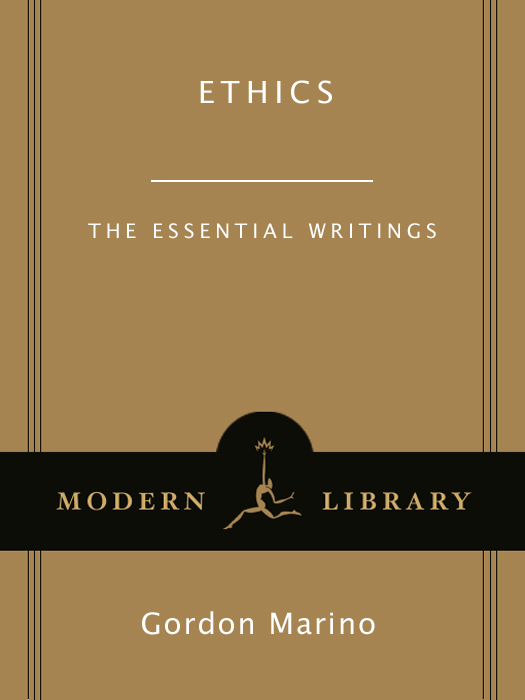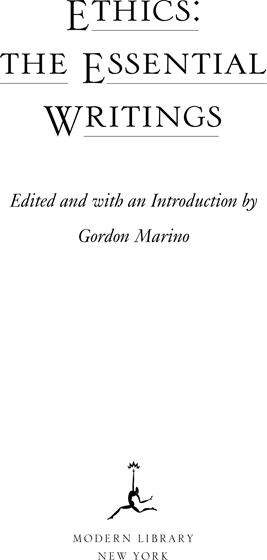WITH BOUNDLESS GRATITUDE FOR
HER INSTRUCTION ON THE PARENT
QUESTION OF THIS COLLECTION, THIS BOOK
IS DEDICATED TO DR. BEATRICE BEEBE
CONTENTS
PART I:
PART II:
28. JUDITH JARVIS THOMSON A Defense of Abortion
DON MARQUIS Why Abortion Is Immoral
INTRODUCTION
Gordon Marino
The existentialists had one thing right. To live is to abide within the chilly coordinates of constant choice, choices about what to value, about how to live our lives, about ethics.
A few years back, I was at the bedside of a friend dying a slow, painful death. There was no hope of a recovery and she was haunted by the concern that she would be gobbling up all of her childrens resources by continuing in her agonizing half-life. Worse yet, she feared that by the time the flames of pain had finished with her, all of her good memories and her repository of loving feelings would be cinder. What, she once said with a sigh, could be more humiliating, what could be worse than not caring anymore about anything except being free of pain? One night, she calmly asked me to hand her a bottle of sleeping pills. I thought for a long moment: If her end was going to be as bad as she imagined it, why not? But it felt too much like playing God, and I demurred.
On my way to a party, I am accosted by an unkempt man who insists that he needs taxi fare to take his feverish baby to the emergency room. Maybe I should trust him and help him out, but then again, would I only be lending a hand to make myself feel better? But waitwhat am I? Some kind of narcissist? What difference do my motives make to a potentially desperate individual?
My mother passed away a few years ago. She had a dear old friend whom I started visiting. A bright, interesting, and kind nonagenarian, she very much looks forward to our chats. However, every time I go to see her, I have to pass through a long ward of Alzheimers patients and, much as I am ashamed to admit it, the sight unnerves me. Between the grief triggered about my mother and my two-way passage through the unit of people who are here and yet not here, I invariably leave the nursing home so depressed that I am not much good to anyone else for about twenty-four hours. Should I continue to visit my mothers friend?
Your friend has applied for a job and you are on the hiring committee. Objectively speaking, he is qualified but his application does not exactly jump to the top of the pile. Years ago, he helped you find a position. You know from experience the glass-in-your-gut feeling of unemployment. Should you try to give his application a boost? Would that be fair? There is an ancient and much prized virtue called loyalty. How should we balance fairness and loyalty when they come into conflict?and they will come into conflict.
Hitler, Mao, Pol Pot, the killing fields of Rwanda, the American harrowing machine of slavery, and the genocide of Native Americansare human beings beasts? How can the horde of us be so easily corrupted and transformed into murderers? Or take it one or two notches up from the moral abyss to the recent scandals on Wall Street and in the banking industry: How could all of these Ivy Leagueeducated businessmen and -women, stalwarts of their communities, defraud people out of their life savings while sipping martinis in the Hamptons?
Abstract, concrete, and in between, the questions about ethics abound. What constitutes moral progress? What criteria should we use to evaluate conduct? Can I morally justify my actions? Should I do the so-called right thing if it is against my self-interest? What is the right thing anyhow? Do good and evil exist independently of humans? Is ethics a body of knowledge? If so, how do we acquire this knowledge? From books? Experience? Both? These are some of the problems that fall within the purview of ethics and this collection. But what unites this family of concerns? What is ethics?
Some say that what we call ethics is nothing more nor less than custom. Listen to Herodotus. In Book Three of his Histories, he writes:
I have no doubt that Cambyses was completely out of his mind; it is the only possible explanation of his assault upon, and mockery of, everything which ancient law and custom have made sacred in Egypt. If anyone, no matter who, were given the opportunity of choosing from amongst all the nations in the world the set of beliefs which he thought best, he would inevitablyafter careful considerations of their relative meritschoose that of his own country. Everyone without exception believes his own native customs, and the religion he was brought up in, to be the best; and that being so, it is unlikely that anyone but a madman would mock at such things. There is abundant evidence that this is the universal feeling about the ancient customs of ones country.
One might recall, for example, an anecdote of Darius. When he was king of Persia, he summoned the Greeks who happened to be present at his court, and asked them what they would take to eat the dead bodies of their fathers. They replied that they would not do it for any money in the world. Later, in the presence of the Greeks, and through an interpreter, so that they could understand what was said, he asked some Indians of the tribe called Callatiae, who do in fact eat their parents dead bodies, what they would take to burn them. They uttered a cry of horror and forbade him to mention such a dreadful thing. One can see by this what custom can do.
In other words custom is king.
Scholars have noted that both the word ethics and the term morals, which are often used interchangeably, derive respectively from the Greek and Latin words for customs. One of Socratess interlocutors in Platos Republic holds that ethics is nothing more than manners or conventions and as such it has no basis in nature. On this account, there is nothing sacred about the injunction not to lie, nothing from on High demanding that we refrain from cruelty. For Socratess antagonist and the throng who think like him, the only law with objective force is written into our pulse and instincts in the form of an innate desire to pursue our self-interests and to take care of those close to us. It is the idea of family values writ large. From this skeptical point of view, norms are socially constructed rules that the strong individual has to learn how to feign following so that he or she can at least appear to be just; but, la Machiavelli, the appearance is all that matters, and only so that the strong person can get what he or she wants.
That ethics has no objective reality, no basis in nature, is half of the gist of the immortal Ring of Gyges myth, again from Platos Republic. According to the story with which Glaucon regales Socrates, a shepherd happens upon a ring that renders him invisible when he rotates the facet inward. The shepherd murders the king and marries his wife. Glaucon insists that any intelligent man who could slip such a ring upon his finger would and should do the same. And if ethics is in fact just custom, a matter of putting the fork on the left side, then maybe Glaucon is correct and there is no reason to refrain from cheating on our taxes and spouses.
In what the philosopher Friedrich Nietzsche would come to see as a sin against human nature, Platos Socrates reasons that not only should we act justly with or without the magical ring, but that the righteous individual who is wrongly declared unjust and severely punished is happier than the scoundrel who bamboozles people and receives honors from the local chamber of commerce. Here the connection between good living (ethics) and the good life


